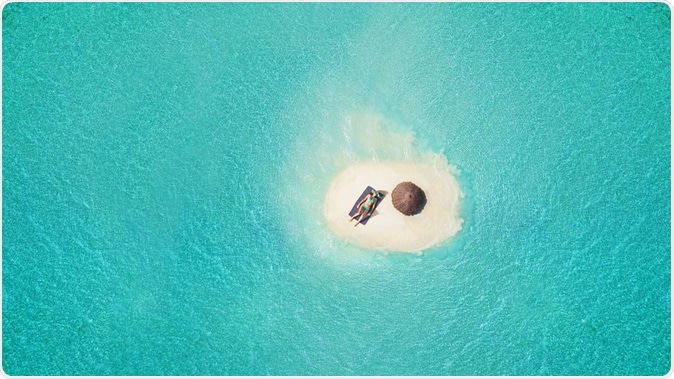Putting on extra kilos during winters has been blamed on holiday treats and less physical activity. Now a new study shows that less exposure to be the key to putting on the weight. A sunny vacation might help lose that extra weight say researchers at University of Alberta in Canada. The study appeared in the journal Scientific Reports.

Image Credit: Jag_cz / Shutterstock
Pharmacology professor from Alberta Diabetes Institute, Dr. Peter Light led a study wherein they noted that the fat cells that lie beneath the top layer of the skin are sensitive to the sun’s rays and they shrink when exposed to sun. They “blue wavelengths” of the sun’s rays are capable of penetrating the skin’s top layers and activate the fat cells. These cells then lose some of their fats. The team of scientists came upon these findings by accident. They were actually trying to modulate and coax the fat cells to make insulin hormone to benefit patients of type 1 diabetes. These diabetics lack the glucose reducing hormone insulin and need regular insulin injections to make up for their needs. While experimenting with the cells, the team noted that these fat cells were responding to the light.
Dr. Light jokingly said that he was living up to his last name and explained that these blue wavelengths of light are also emitted by cellphones, laptops and other LED monitors and they have been seen to increase alertness, reduce sleep by decreasing sleep hormone melatonin. Now they note that these fat cells too respond to the light rays in similar manner. Light explained that this could be the reason behind weight gain among people who live in northern regions with little sunlight. “It (sun light) may help regulate your body weight and a lack of it may actually lead to extra storage of [fat] in the winter,” he said. Tanning beds or blue light lamps however have not shown similar effects he warned. The sun’s rays are only powerful enough to penetrate the skin and alter the fat cells he explained. One to five percent of the blue light is capable of penetrating the skin and the sun can do this with short time sun exposure he said.
Dr. Light added that this was a hypothesis yet and needed more work to be proven and understood in details before it could be recommended as a weight loss measure. Further, the risk of getting skin cancers from sun exposure on unprotected skin is also a fear and needs to be considered. However Dr. Light hopes that this could pave the way for development of new drugs and light therapy for effective weight loss in obesity, diabetes and other health problems.
Source:
https://www.nature.com/articles/s41598-017-16689-4